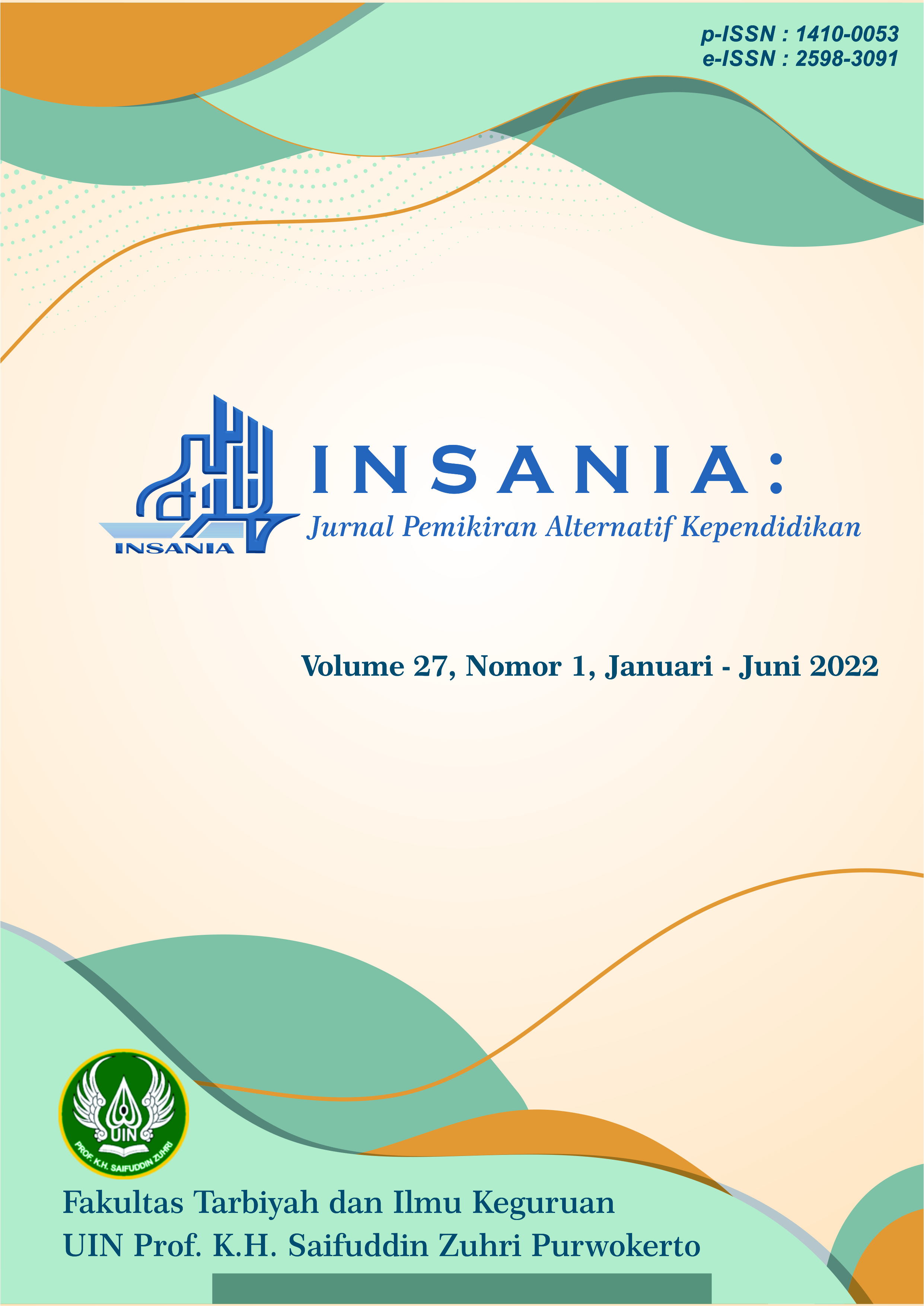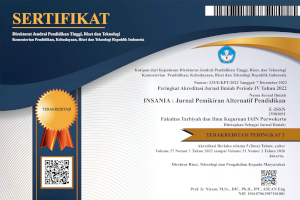Pedagogical Values in Pestalozzi's Philosophy
DOI:
https://doi.org/10.24090/insania.v27i1.6579Keywords:
Pedagogy of love, Pestalozzi, student’s potential, student center learningAbstract
In globalization, education is the main foundation for developing the potential of human resources in every country. In realizing ideal educational outcomes, it is necessary to create positive pedagogical values that allow students to grow optimally according to their essential potential. One of the educational philosophies that influence modern educational practice almost worldwide is Pestalozzi's philosophy of education. The purpose of this study is to explore the pedagogical values in Pestalozzi's philosophy. This research is a literature study, and it analyzes Pestalozzi's pedagogical values to be developed as positive pedagogic values in schools today. The analyzed documents were open access and peer-reviewed papers, or articles related to Pestalozzi from ERIC, Mendeley, Academia Edu, and CiteSeerX. It was found that ten documents met the requirements and contained data of Pestalozzi's pedagogy. The results showed that the main pedagogical values of Pestalozzi were the pedagogical values of love and moral values. Both values remain reliable as the basis for the development of classroom management by current teachers. Further research on compassion and moral-based pedagogy needs to be conducted.Downloads
References
Børsen, T., Serreau, Y., Reifschneider, K., Baier, A., Pinkelman, R., Smetanina, T., & Zandvoort, H. (2021). Initiatives, Experiences and Best Practices for Teaching Social and Ecological Responsibility in Ethics Education for Science and Engineering Students. European Journal of Engineering Education, 46(2), 186–209. https://doi.org/10.1080/03043797.2019.1701632
Dewantara, K. H. (1977). Karya Ki Hadjar Dewantara Bagian Pertama: Pendidikan. (2nd ed.) Majelis Luhur Persatuan Tamansiswa.
Dimić, Z. (2021). Pestalozzi and Fichte – The Power of Education. Годишњак За Педагогију, VI(2), 71–81. https://doi.org/10.46630/gped.2.2021.5
Dwiningrum, S. I. A. (2017). Menciptakan Belajar yang Humanis Tantangan Pendidik yang Profesional dan Berkarakter. Jurnal Pembangunan Pendidikan: Fondasi dan Aplikasi, 4(2), 154–165. https://doi.org/10.21831/jppfa.v4i2.12420
Dwivedi, A. V. (2016). Philosophical, Ideological, and Theoretical Perspectives on Education by Gerald L. Gutek. Alberta Journal of Educational Research, 62(2), 220–222. https://doi.org/10.11575/ajer.v62i2.55996
Eisler, B. R. (2001). Partnership Education in the 21st Century. Encounter, 15(3), 5–12.
Enriquez, O. N, & Oliver, K. L. (2021). ‘The Collision of Two Worlds’: When a Teacher-Centered Facilitator Meets a Student-Centered Pedagogy. Sport, Education and Society, 26(5), 459–470. https://doi.org/10.1080/13573322.2020.1738374
Händel, M., Stephan, M., Gläser-Zikuda, M., Kopp, B., Bedenlier, S., & Ziegler, A. (2020). Digital Readiness and Its Effects on Higher Education Students’ Socio-Emotional Perceptions in the Context of the COVID-19 Pandemic. Journal of Research on Technology in Education, 54(2), 267–280. https://doi.org/10.1080/15391523.2020.1846147
Heafford, M. R. (2016). Pestalozzi: His Thought and Its Relevance Today. Routledge. https://doi.org/10.4324/9781315441405
Iivari, N., Sharma, S., & Ventä-Olkkonen, L. (2020). Digital Transformation of Everyday Life – How COVID-19 Pandemic Transformed the Basic Education of the Young Generation and Why Information Management Research Should Care?. International Journal of Information Management, 55, 1–6. https://doi.org/10.1016/j.ijinfomgt.2020.102183
Isnanto, I., Pomalingo, S., & Harun, M. N. (2020). Strategi Pengelolaan Kelas di Sekolah Dasar. Jurnal Pendidikan Glasser, 4(1), 7–24. https://doi.org/10.32529/glasser.v4i1.392
Korostelev, A. A., Morozova, I. M., Gruzdeva, M. L., Smirnova, Z. V., Vaganova, O. I., Chanchina, A. V., & Maltseva, S.
M. (2019). Modern Information and Communication Technologies in the Advanced Education of Children. International Journal of Innovative Technology and Exploring Engineering, 8(9), 2376–2382. https://doi.org/10.35940/ijitee.i8939.078919
Leshkovska, E. A., & Spaseva, S. M. (2016). John Dewey’S Educational Theory and Educational Implications of Howard Gardner’s Multiple Intelligences Theory. International Journal of Cognitive Research in Science, Engineering and Education, 4(2), 57–66. https://doi.org/10.5937/IJCRSEE1602057A
Li, S., & Zizzi, S. (2018). A Case Study of International Students’ Social Adjustment, Friendship Development, and Physical Activity. Journal of International Students, 8(1), 389–408. https://doi.org/10.32674/jis.v8i1.171
Lilley, I. M. & Heafford, M. R. (1967). Review of Pestalozzi: His Thought and Its Relevance Today. British Journal of Educational Studies, 15(3), 335–335. https://doi.org/10.2307/3119478
Malafantis, K. D. (2021). The Reception of the Ideas of j.H. Pestalozzi in the Greek Region During the 19th Century. History of Education and Children’s Literature, 16(1). 371–382.
Mondisa, J. L., & Adams, R. S. (2020). A Learning Partnerships Perspective of How Mentors Help Protégés Develop Self-Authorship. Journal of Diversity in Higher Education, 15(3), 337–353. https://doi.org/10.1037/dhe0000291
Morel, G. M. (2021). Student-Centered Learning: Context Needed. Educational Technology Research and Development, (69), 91–92. https://doi.org/10.1007/s11423-021-09951-0
Msane, J., Murimo, B. M., & Chani, T. (2020). Students’ Perception of the Effect of Cognitive Factors in Determining Success in Computer Programming: A Case Study. International Journal of Advanced Computer Science and Applications, 11(7), 185–190. https://doi.org/10.14569/IJACSA.2020.0110724
Muloko, E., Limbu, R., & Anakaka, D. L. (2020). The Difference of the Triangular Theory of Love in Married Women Judging from the Length of Marriage. Journal of Health and Behavioral Science, 2(4), 264–276. https://doi.org/10.35508/jhbs.v2i4.2808
Nusser, T. W. (2020). Experience Informed Philosophy. Educational Considerations, 45(2), 1–15. https://doi.org/10.4148/0146-9282.2205
Papasterevski, D., & Radevski, A. (2021). Restoration of the Elementary School “Johann Heinrich Pestalozzi”-Skopje. South East European Journal of Architecture and Design, 2021, 1–5. https://doi.org/10.3889/seejad.2021.10058
Perrotta, F., & Pannelli, A. (2014). Prospects for Teaching a New School of Education in the New Century. Sport Science, 7(1), 71–75.
Rucker, T. (2014). Political Bildung in the Context of Discipline, Instruction, and Moral Guidance. Journal of Social Science Education, 13(1), 11–21. https://doi.org/10.2390/jsse-v14-i1-1276
Sellars, M., & Imig, D. (2021). Pestalozzi and Pedagogies of Love: Pathways to Educational Reform. Early Child Development and Care, 191(7–8), 1152–1163. https://doi.org/10.1080/03004430.2020.1845667
Sidik, F. (2016). Pendidikan Humanis dan Implikasinya dalam Pembelajaran. Tadbir: Jurnal Manajemen Pendidikan Islam, 4(1), 88–95.
Siddiky, M. R. (2020). Examining the Linkage between Students’ Participation in Co-curricular Activities and their Soft Skill Development. Journal of Educational Sciences, 4(3), 511–528. https://doi.org/10.31258/jes.4.3.p.511-528
Snyder, H. (2019). Literature Review as a Research Methodology: An Overview and Guidelines. Journal of Business Research, 104, 333–339. https://doi.org/10.1016/j.jbusres.2019.07.039
Sorokowski, P., Sorokowska, A., Karwowski, M., Groyecka, A., Aavik, T., Akello, G., Alm, C., Amjad, N., Anjum, A., Asao, K., Atama, C. S., Atamtürk Duyar, D., Ayebare, R., Batres, C., Bendixen, M., Bensafia, A., Bizumic, B., Boussena, M., Buss, D. M., … Sternberg, R. J. (2021). Universality of the Triangular Theory of Love: Adaptation and Psychometric Properties of the Triangular Love Scale in 25 Countries. Journal of Sex Research, 58(1), 106–115. https://doi.org/10.1080/00224499.2020.1787318
Supardi, S., & Hasanah, E. (2020). Junior High School Students’ Experiences of High Technology Based Learning in Indonesia. International Journal of Learning, Teaching and Educational Research, 19(5), 153–166. https://doi.org/10.26803/ijlter.19.5.9
Williamson, K., Given, L. M., & Scifleet, P. (2018). Qualitative Data Analysis. In Williamson, K. & Johanson, G. (Ed). Research Methods: Information, Systems, and Contexts (2nd ed.) (pp. 453–476). Elsevier Ltd. https://doi.org/10.1016/B978-0-08-102220-7.00019-4
Yorke, L., Rose, P., Bayley, S., Wole, D., & Ramchandani, P. (2021, March 15). The Importance of Students’ Socio-Emotional Learning, Mental Health, and Wellbeing in the Time of COVID-19. Riseprogramme.Org. https://riseprogramme.org/publications/importance-students-socio-emotional-learning-mental-health-and-wellbeing-time-covid-19
Downloads
Published
How to Cite
Issue
Section
License
Authors who publish with this journal agree to the following terms:
Authors retain copyright and grant the journal right of first publication with the work simultaneously licensed under a Creative CommonsAttribution-ShareAlike License that allows others to share the work with an acknowledgment of the work's authorship and initial publication in this journal.
Authors are able to enter into separate, additional contractual arrangements for the non-exclusive distribution of the journal's published version of the work (e.g., post it to an institutional repository or publish it in a book), with an acknowledgment of its initial publication in this journal.
Authors are permitted and encouraged to post their work online (e.g., in institutional repositories or on their website) prior to and during the submission process, as it can lead to productive exchanges, as well as earlier and greater citation of published work (See The Effect of Open Access).









